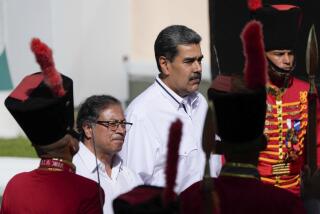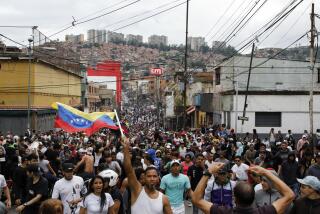Parliamentary recount deals blow to Zimbabwe’s Mugabe
- Share via
JOHANNESBURG, SOUTH AFRICA — Zimbabwean President Robert Mugabe saw his hold on power weaken Saturday as his party failed to make any inroads in a recount of parliamentary balloting and some loyalists expressed pessimism about his chances in a presidential runoff.
The Zimbabwe Election Commission announced the results of 18 of 23 parliamentary seats whose vote tallies are being recounted, nearly a month after bitterly disputed elections appeared to give the opposition the edge over the 84-year-old president. The ruling ZANU-PF party needed to take back nine seats to regain control of parliament, but none of the 18 results was overturned.
“It’s really a heavy blow,” said a senior ZANU-PF official and key Mugabe ally who spoke on condition of anonymity. “Now that there is no change in the recount, I believe that this now gives people second thoughts.”
Although some in Mugabe’s inner circle appeared determined to cling to power at all costs, the senior official said many in the party saw no hope of victory if a second round of voting was held in the presidential election and had given up hope of retaining power. Most saw as their best chance a government of national unity.
Official results in the presidential vote might be released Monday. Ruling party officials have already conceded publicly that opposition leader Morgan Tsvangirai garnered more votes than Mugabe in the election. The opposition maintains that Tsvangirai won outright with no need for a runoff, a position not supported by independent electoral monitors.
Since the March 29 elections, hundreds of opposition activists and supporters have been beaten and seriously injured. Hundreds more have been arrested.
“I don’t think anything will change the direction of the presidential elections. This is what we are seeing on the ground,” the ZANU-PF official said, adding that widespread hunger had made it almost impossible for Mugabe to win. “If there’s a rerun, whether or not there will be violence, I don’t think that will give us the upper hand, whatever methods we are going to use in campaigning.”
But he warned that top military and security officials remained deeply skeptical about Tsvangirai, and that there was a real threat of a military coup or descent into violent civil unrest.
“The only way to solve the problem without bloodshed is that both parties must agree to form a government of national unity. In the absence of that . . . rest assured there will be serious violence in this country. I don’t know how things will end,” he said.
The official said wavering support for Zimbabwe in the Southern African Development Community, a regional body, had also weakened resolve in the ruling party. Southern African countries last week refused to allow a Chinese ship with a cargo of weapons to unload and transport the cargo to Zimbabwe, which is landlocked.
“The SADC community is now changing, and that is also discouraging people,” the official said. “People are saying, ‘Without the support of SADC, how can we fight on?’ ”
A retired army officer with close ties to the ruling party said many ZANU-PF figures believed that the campaign of violence against the opposition could not save Mugabe and that he would lose more support in a presidential runoff.
“More importantly, the situation with food is getting worse and worse,” the war veteran said. “The whole political atmosphere is uncertain. It is so repressive and so terrifying that people believe it cannot be sustained for too long.”
Jonathan Moyo, an independent lawmaker who was once close to Mugabe, said the failure to win back control of parliament had crushed the will of the ruling party, but he said it was difficult to predict what might come next.
“They have clearly lost control. What has happened has shattered the confidence of the ruling party,” he said. “The majority of people in ZANU-PF are silent. They have gone into hiding. There’s a deafening silence from the usual noisemakers in ZANU-PF.
“They’re now thinking about the consequences of doing and saying things. They are no longer sure that ZANU-PF will prevail.”
Moyo said there is now a broad consensus that the best outcome was a negotiated transition, with Mugabe stepping down.
Other possibilities were that a presidential runoff could be held, or that Tsvangirai could boycott a runoff and the authorities would then declare Mugabe the winner.
“And then we would have a political stalemate,” Moyo said, “because a Mugabe victory will not be accepted by anyone.”
--
More to Read
Sign up for Essential California
The most important California stories and recommendations in your inbox every morning.
You may occasionally receive promotional content from the Los Angeles Times.













